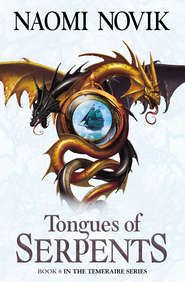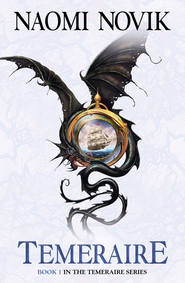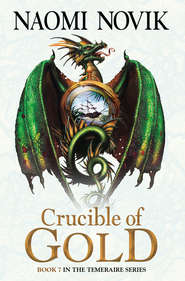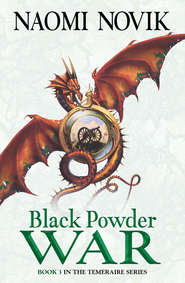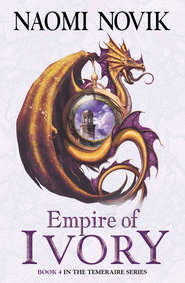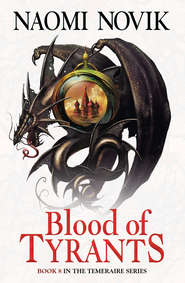По всем вопросам обращайтесь на: info@litportal.ru
(©) 2003-2024.
✖
League of Dragons
Автор
Год написания книги
2019
Настройки чтения
Размер шрифта
Высота строк
Поля
“I do not see,” Churki said. “I have never heard this man’s name. How does he know Hammond or Laurence at all, and how does he know that they are at this lodge? Why should it be his business to send a letter on their behalf? I am by no means satisfied.”
Forthing was inclined to argue with her, but Temeraire interrupted. “Dyhern,” he said, “if this gentleman is your acquaintance, perhaps you will oblige me by going to call upon him, and asking him the direction of this lodge. After all, it must be outside the city somewhere; there could be no real harm in our going to look in upon them, and if they have only stayed the night because of their horses being tired, we might bring them home.”
He finished decidedly, with a flip of his tail, and felt he had struck a sensible, a reasonable course of compromise, without permitting himself to grow overly alarmed as Churki had. But Forthing, of course, could only bleat objections. “There is no call for your chasing off after Captain Laurence,” he said. “What if he should have left by the time you got there? He would come straight here, and want to know what had become of you; meanwhile you would be flying about half-distracted, supposing the worst, and what if we should get orders to fight?”
“We will not get orders to fight,” Temeraire said. “We have wanted orders to fight for three weeks, and we have not had any; we are not going to get some now.”
He turned his head even as he spoke: at last here was Ferris coming back into the clearing. Forthing said, “Mr. Ferris, I hope you have word from the captain; I am sure you will tell us everything is well, and there is no reason for any sort of alarm.”
“Oh, will I,” Ferris said, and Temeraire, looking closely, saw that his face was set and furious. “He is gone to a meeting; some caper-merchant Russian lag-wit insulted the Emperor of China to his face at a party last night, and he struck the man. I cannot find anyone to tell me where it is, but I have learned for a certainty that one of the man’s friends called on Hammond this morning, some fellow named Karloff or Karlow.”
“Good God!” Forthing cried, and there was a general noise of excitement and babble among the crew, which made it quite impossible at first for Temeraire to understand what exactly had happened, and why they should be so distressed that Laurence had—quite justifiably—chastised a rudesby, and what any of this had to do with meetings or hunting-lodges. “Captain Dyhern, pray will you go at once,” Forthing was saying, and Dyhern was already coming out of his tent, in his coat and his hat, and Baggy said, “I will run ahead and get you a carriage, sir,” and pelted away towards the street again.
“What is the to-do?” Roland said, looking as Baggy flew past her; she was coming back the other way. “Did Baggy have any luck finding the message-boy?”
“Roland,” Temeraire said, putting a forefoot before her, so she could not be swallowed up in the general chaos, “pray tell me at once what it means, that Laurence has gone to a meeting.”
“He wouldn’t,” she said, but at once said, “Oh, but he would, wouldn’t he; has he?”
“Yes,” Temeraire said, gripped with horror. “Roland, what is a meeting?”
“The worst nonsense anyone ever heard of, and he knows perfectly well better; if Mother were here, she would throw him in stocks for it, if he has not got himself shot,” Roland said, stormily.
“Shot?” Temeraire said blankly. “Shot?”
“He has gone to fight a duel,” Roland said.
Nearly the most dreadful hour of Temeraire’s life followed on this intelligence: an hour in which he could do nothing, knowing all the time that somewhere not an hour’s flight away, Laurence might at this very moment be stepping upon a field of honor. This was aptly named, it seemed to Temeraire, as honor was a word which seemed associated with every worst disaster in his life: a hollowness for which Laurence had before now been willing to die in the most unnecessary fashion, and this one more unnecessary than ever. “For no-one could suppose Laurence was a coward,” Temeraire said. “Not even anyone who disliked him extremely: I have heard the Admiralty tell him he had not enough fear.”
“It isn’t the captain that anyone would call a coward, sure,” O’Dea said, “but the other fellow that he struck; and the captain’s too much a gentleman to hit another and not let him have satisfaction, if he ask for it. Ah, the sword and the pistol have made much food for worms ere now out of men of honor, and watered the soil with blood and the tears of their relics. I have known eight men shot dead in duels, on the greens of Clonmel.” He patted Temeraire’s foreleg, in what perhaps was meant to be a comforting gesture; but Temeraire was too stricken to feel any sense of gratitude.
His crew had scattered out into the city, all of them trying to learn where the duel was to be held, and when; Dyhern was engaged in canvassing his acquaintance among the Prussian officers to find some intelligence of Von Karlow. Temeraire had thought of flying passes over the town, but Ferris had dissuaded him. “As likely as not, they are fighting somewhere outside the city, or beneath some trees, and if you terrify everyone into hiding behind closed doors and shutters, we will never find out where in time.”
He spoke of in time, but Laurence had been gone so long already; and every minute dragged onwards. Some of the crew came straggling back, without anything to report, until a pale and sweating Cavendish came back; he said, “Is Mr. Forthing anywhere?”
“He has not come back yet,” Temeraire said. “What have you heard?”
“What about Mr. Ferris?” Cavendish said, and then he wished to wait for Captain Dyhern to return, and then desperately, “Well, perhaps Roland will be back, in a little while,” and Temeraire realized he was trying to put off bad news.
“Tell me at once,” Temeraire said.
“I don’t know anything,” Cavendish said, but a low awful growling was building in Temeraire’s throat, thrumming against the ground, and Cavendish swallowed and said, “I don’t, nothing certain! Only I went along of Captain Dyhern to the public house, where that Karlow fellow is supposed to have rooms; he wasn’t there, so Captain Dyhern went on, but I overheard a couple of fellows in the taproom, from an infantry regiment, talking over a duel—but they didn’t know anything, not really; they didn’t know it was our captain—”
“What did they say?” Temeraire said.
“They said,” Cavendish said, “they said someone had fought a fatal duel, somewhere outside the city,” Temeraire felt the world drag to a halt, suspended, “and they said—they said it was Von Karlow’s own fault, seconding a coward, because—because his man fired ahead of the signal.”
“He is dead, then,” Churki said. “And without even a single child! I am so very sorry, Temeraire.”
“No,” Temeraire said, “no; he is not dead,” blindly, and Dyhern came panting up the hill, shouting, “He is not dead! He is not dead, thank the good God.”
“He is not?” Temeraire said, thrusting his head down low to the ground, the world lurching back into motion.
Dyhern caught Cavendish by the ear and shook him. “What do you mean by repeating nonsense like that, you young sow’s head? Keep your mouth shut, next time. He is not dead,” he repeated, and had to let go the wincing Cavendish to bend himself double, hands braced on his knees, to get back his air: Dyhern was a big man, and though he had lost a great deal of flesh to grief and to winter, his wind was not so remarkable that he could cheerfully run up the steep hillside to the entry gates.
“Then what has happened?” Temeraire cried.
“The other man,” Dyhern said, “is dead.”
“Oh! That is just as well,” Temeraire said, immensely relieved. “If he were not, I should certainly have killed him; but I am glad Laurence has already done so. Why has he not come back?”
“He did not kill his man,” Dyhern said. “Hammond did.”
“What?” Churki said, sitting up sharply. “What has Hammond to do with killing anyone? He is not a soldier!”
Dyhern did not say anything more, waving away the questions as he heaved for breath; then he went to his tent and came out with his harness. “I will tell you all, once we are in the air,” he said. “We are flying west. Von Karlow has given me their direction. Here, be useful now,” he added, to Cavendish, “and get aboard. We may need hands. You there, O’Dea, you will tell the officers where we have gone. Give me your paper, I will write the direction.”
Temeraire did not argue, because he agreed with Dyhern: Laurence was alive, and all further intelligence might be deferred in the interest of going to him at once. He waited impatiently for Dyhern to finish scribbling his note, and then held out his claw for him and for Cavendish, to put them up more quickly on his back. “Well?” he said. “Have you latched on?” and hearing the carabiner-clicks did not wait for an answer, but launched himself into the air.
Laurence woke in the night coughing, a sharp pain in his side, and found Dyhern bending over him and the household in weeping terror. “Take him, take him!” the goodwife was saying in rough German, making pushing gestures at Laurence with her hands. “Give the dragon!”
Dyhern calmed her with a stern speech in that language, too quick for Laurence to follow, and turning back said, “Rest, Captain, I will tell Temeraire you cannot be moved,” and then was gone again. Laurence fell back into fitful and uneasy sleep and woke again with the household in fresh dismay, shrieks rousing him: it was daylight outside, and Temeraire had put his enormous eye up to the window to peer in at him.
“Temeraire,” Laurence tried to say, and then he was dreaming again, of beef: fresh hot roast beef, the juices running red and rare, until these became rivulets of blood dripping from Dobrozhnov, a dead groaning corpse who came close and closer and put out clammy hands to grasp Laurence’s arms; he woke with a jerk in an unpleasant but welcome sweat, too warm: his fever had broken. There was a pot of beef broth cooking over the fire.
He drank nearly all of it, and then realized that the groaning soul in the cot across the room from him was Dobrozhnov: still alive, despite a bullet gone through his chest. “Good God, why is he here?” Laurence said to Hammond.
“I am very sorry for the circumstances, Captain; he could not be moved, and indeed, we hardly foresaw any reason to do so,” Hammond said uneasily, looking towards the cot. “The doctor was quite sure of his being dead before now. But I am very glad to see you so improved: will you eat a little more?”
“With pleasure,” Laurence said, “when I have spoken to Temeraire.”
This required the support of Dyhern’s strong shoulders, and the use of the household’s only bed and its meager supply of pillows; limping across the chamber was even so a remarkably painful process of transfer, and when Laurence at last was lying upon the bed, he was forced to accept another swallow of laudanum from Hammond, and catch his breath for some twenty minutes before he could again speak to let them know they might open the door.
Temeraire put his head up to it, anxious, deeply distressed. “Anyone might have guessed,” he said with immense reproach, “that the sort of person who would insult the Emperor would cheat, and here you are wounded!”
“I assure you I feel very much better,” Laurence said, although he was indeed in severe pain, which the laudanum only served to cloud and not remove. He heard and understood only distantly: his attention was fixed on his own words, struggling to keep in mind that he must say nothing of Dobrozhnov, still lying helpless in the room behind him. Temeraire could not know him still alive.
“I have been speaking with Dyhern a great deal on the subject of dueling,” Temeraire said, “and it seems plain to me that something must be done. You must give me your word, Laurence, that if anyone ever should insult you again, they must be told at once that I will insist on being your second myself. I am very much indebted to Mr. Hammond for having killed that wretched fellow, but in future, if anyone likes to prove they are not a coward by insulting you, they may fight me, and then they cannot complain of not having had satisfaction: I am sure everyone will agree they were brave, once they are dead. Pray promise me, and then you must go have some more beef broth,” he insisted.
Laurence said vaguely, “As you wish,” having become unable to follow the conversation, and was grateful to be carried back to the fire, still in the bed, and to eat a little more broth. This the daughter of the house brought him, and sat by him for a while frowning, and then in a little awkward German spoke to him, asking quite seriously if the dragon obeyed him because he was a devil. This notion she proposed with an air of interest more than horror, and seemed reluctant to accept Laurence’s denial. When he awoke from a long drowse, he did so finding her carefully putting his hand onto the family crucifix, and in some exasperation he took hold of it, showed her he had not the least hesitation in doing so, and kissed it: a Popish gesture, but convincing. She seemed however disappointed, and demanded to know how he did control the dragon.
“Ask Hammond,” Laurence said, too weary to struggle on in German, of which he had very little even under better circumstances. “He has a dragon also.”
Hammond was meeting with very little success in controlling his dragon in any manner, however: Churki was in a mood of great severity, which had been not at all improved by learning the details of Hammond’s behavior in the duel, which she loudly characterized as ridiculous and inappropriately dangerous. The next day Laurence felt improved enough to be carried out of doors for a brief airing; he was glad to escape the cottage briefly despite the cold, as Dobrozhnov persisted in not dying and had begun to moan almost incessantly from pain. By then he found a serious quarrel brewing between the beasts: Churki was inclined to blame him for having dragged Hammond into the affair, and Temeraire was inclined to blame Hammond for the reverse, and an atmosphere of resentment had settled between them.
“A pretty thing to be accusing you of,” Temeraire said, snorting with sufficient force to blow the snow before him into a cloud, “when you are so badly wounded you groan day and night,” and then he paused with a sudden puzzled expression and looked over at the cottage, from which had just issued one of these groaning noises.
“I do not cry out, I assure you,” Laurence said hastily, hoping to divert Temeraire’s attention: Temeraire would certainly kill Dobrozhnov at once if he learned of the man’s survival, and very likely have the house in ruins on all its occupants besides. “—I am not uncomfortable.”






